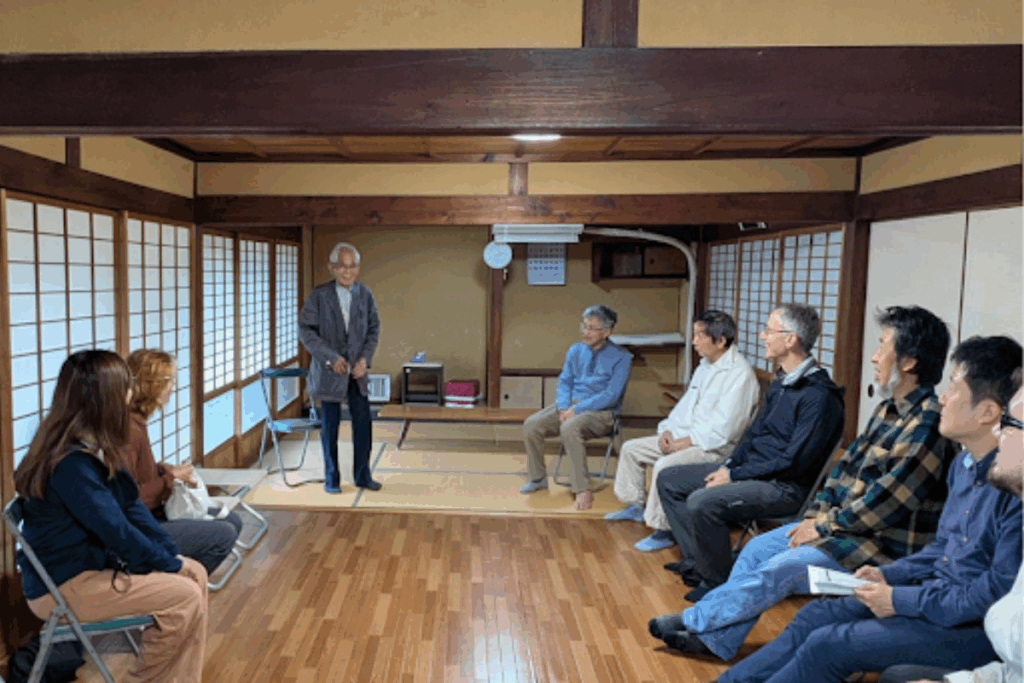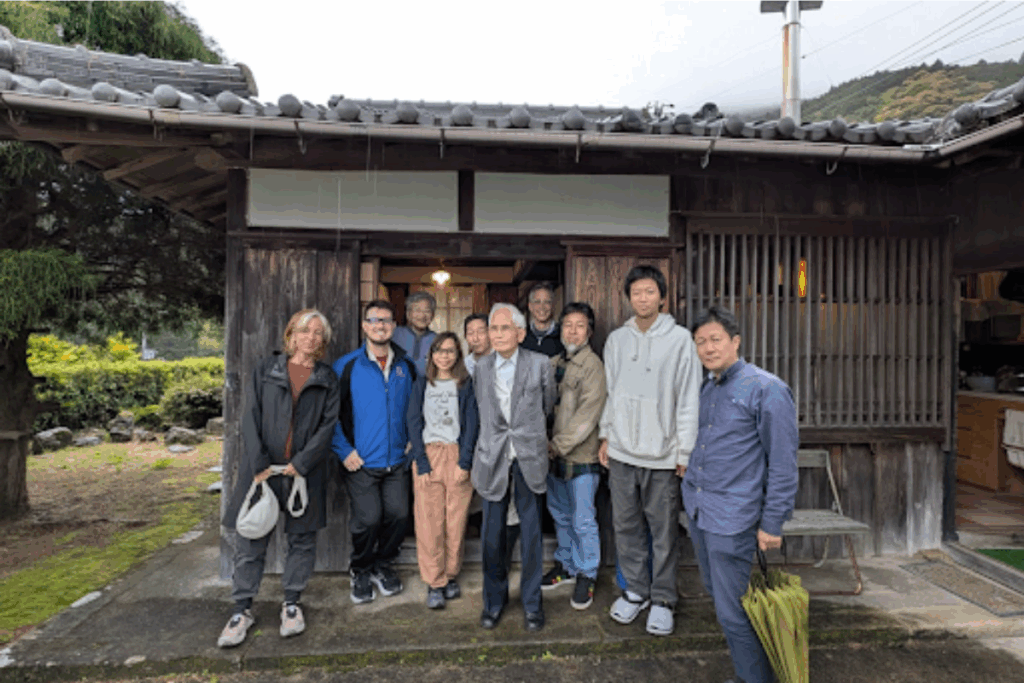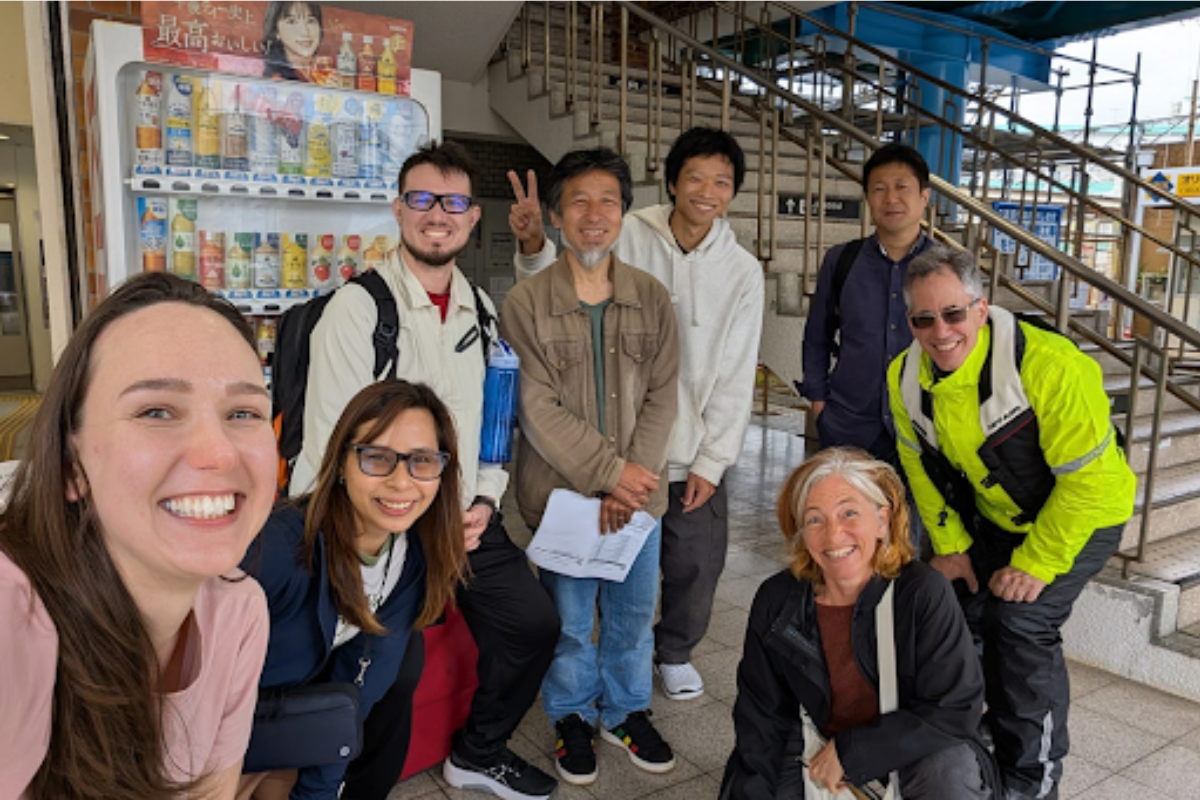“We Arrived as Investors. Left as a Part of The Community.”
On May 9th, we arrived in Wakayama in the Kansai area as strangers to the local community. We were a group of co-owners connected by shared ownership, but not much else. Some of us had never met before. By the time we left three days later, something had fundamentally shifted, not just between us as PlanetDAO members, but between all of us and the incredible Irokawa community that welcomed us with open arms.
What started as a Spring Gathering became something none of us expected: the beginning of relationships that feel like they’ll last lifetimes. The experience became the reason to return and to miss this unique village. But let’s start from the beginning.
Meeting The Local Community Leaders
Have you ever met someone whose story lingers in your mind, leaving a lasting impression? That’s what happened after we spent three days learning about Irokawa, a small community in the Nachikatsuura region of Wakayama Prefecture, from Takora-san, Hara-san, Okubo-san and the other Irokawa residents who sat down with us to share their stories. What we learned blew us away.

Takora-san is the oldest community member, a visionary parishioner of the 170-Year-Old Temple and a leader of resettlement policy dedicated to preserving local heritage while fostering a warm, welcoming community in Ohno. Fifty years ago, Irokawa was shrinking much like many rural Japanese communities. Kids were growing up and leaving, the kindergarten was about to close and traditions were fading. With enrollment numbers rapidly approaching the critical threshold of 10 students (below which government support would cease) Takora-san was compelled to take action to save the kindergarten and the village.
One by one, people arrived—not families looking for a quiet suburban life, but individuals choosing something radically different. One family came from Niigata with dreams of organic farming, followed by a journalist from Kyoto who brought expertise in chemical-free agriculture.
What surprised us most was how well everyone knows each other. Not just names, but skills, histories, family stories, dates and the specific ways each person contributes to keeping the community alive. This is what a true community looks like. The people we met literally depend on and support each other in order to survive earthquakes, bad crop years and harsh winters.
We found ourselves thinking of our own PlanetDAO community. Here they were, co-owners who’d invested together but were still learning about each other’s backgrounds and skills, watching how naturally the Irokawa residents collaborated and supported each other. The experience gave us a template for the kind of bonds we wanted to build between ourselves.

When Morioka-sensei Opened Our Eyes
Morioka-sensei is a local architect, who believes that “architects are doctors of buildings,” who returned to the Nachi region after decades in Tokyo and Kanagawa, all to support and revitalize local communities. Walking through the 170-Year-Old Temple with Morioka-sensei felt like getting a masterclass in architecture from someone who is passionate and experienced. But more than that, it was watching our group of PlanetDAO co-owners discover something together: that moment when you’re all looking at the same thing and suddenly everyone understands something hidden, turning what was once mundane into a moment infused with meaning.

“Look,” Morioka-sensei said, pointing to where wooden beams joined without a single nail. “Everything connects through wakugi joinery. The building breathes, flexes, endures.” Some of us had backgrounds in construction or design, others were complete novices, but we all found ourselves fascinated by the same details.

The sliding shoji doors weren’t barriers but invitations, designed not for protection but to blur the line between inside and outside. The ranma panels let air and emotion flow freely. Even the windows were conceived as frames for the natural world beyond. “Japanese architecture isn’t about shutting the world out,” he told us. “It’s about letting in light, wind, seasons, energy or even feelings and emotions.”


Our co-owners asked plenty of questions, and as their understanding grew step by step, so did their appreciation and connection to the temple. You could feel the connections forming between us, the building and the area.



Sleeping in the Sacred Space
Here’s where things got really interesting. Most of our PlanetDAO group volunteered to spend a night at the 170-year-old local temple before its renovation. The group was roughing it—I mean really roughing it. No electricity, no plumbing, just an old-fashioned “drop” bathroom and sleeping bags spread across the main hall floor.
The local community members were amazed that so many people from our group chose to stay in such basic conditions. “Most visitors want hotels, we’re surprised,” one of the locals said. But our willingness to embrace the temple’s raw, pre-renovation state seemed to earn us a different kind of respect and welcome.
You might think sleeping in a 170-year-old temple would be romantic and peaceful. The reality? It was cold, the floor was hard and none of us slept particularly well. But something magical happened in those shared hours of discomfort and vulnerability.

Lying there in our sleeping bags and whispering to each other in the dark like kids at summer camp, we found ourselves creating a connection that usually takes months to develop. People shared personal stories, fears about the future and dreams for what PlanetDAO could become. The formal boundaries between us as co-owners completely dissolved.
One person talked about why they’d really joined PlanetDAO. It wasn’t just about the investment, but about finding community in an increasingly disconnected world. Another shared their background in sustainable living, tourism and more. By morning, we weren’t just co-owners anymore.

As the first light of dawn stretched across the sky, warm hues of orange and gold bathed the landscape, signaling the start of a new day. The sun’s rays pierced through the dissipating clouds, gradually revealing the majestic peak and offering a breathtaking view of the sea beyond. Birds began to sing their morning melodies, their songs echoing through the valley, harmonizing with the gentle increase in the village’s daily rhythms.
In this serene setting, conversations among the PlanetDAO community deepened. By morning’s light, we had evolved from mere co-owners to a cohesive community, united by shared values and purpose.
The Forest Hike And Natural Water Resources
Tamura-san is known in the village for his supportive nature, particularly in championing Takora’s community projects. He is an active participant in key community events and he proudly lives the sustainable lifestyle. He led our group up the steepest, most beautiful forest path by the river to reach the community’s water source. The trail was covered in moss and felt as if we were walking through a Japanese fairy tale or something straight from a Ghibli movie.
We were huffing and puffing together, helping each other over fallen logs, asking Tamura-san a million questions about how the whole system worked. Such a system is something we don’t really see in cities. Here was this incredibly simple but effective setup: river water channeled through hoses to tanks scattered throughout the settlement. Beautiful, sustainable and requiring constant community effort to maintain.
“If it rains for two days, it gets clogged,” Tamura-san explained as we examined the pipes. The maintenance is manual, strenuous and sometimes dangerous as the rocks get wet, and wild boars and deer share these paths. But when elderly residents call because their water has stopped flowing, people such as Tamura-san simply go up the hill to help, even in the middle of the night. This was one of the examples of the strong ties and dependency between each person in the community.

Walking back down, we all realized that this is what resilience actually looks like. Not high-tech solutions or individual preparedness, but people taking care of each other and the systems they all depend on.
That evening, our PlanetDAO group found ourselves talking late into the night about what we’d seen. How could we build that same spirit of mutual support in our own community? What would it look like for us to take care of each other the way Irokawa residents do? We also shared food and heard stories about Irokawa’s various fauna.
Learning Words We Didn’t Know We Needed
Here’s something that caught us completely off guard: the word tōshika (investor) doesn’t land well in rural Japan. To many locals, it suggests people who swoop in for profit without caring about the community.
We learned this during one of our evening conversations with Irokawa residents, and it sparked this amazing discussion among our PlanetDAO group about what we actually are and what we want to be. Are we investors? Co-owners? Something else entirely?
By the end of our stay, we’d found out that we are people who value relationships and community wellbeing as much as any returns. The distinction matters, both in how we’re received by communities such as Irokawa and how we see ourselves and our role in PlanetDAO.
What really moved us was how the local community received us once this understanding was clear. People were genuinely curious about us, our backgrounds and what brought us together. We found ourselves in these wonderful conversations where locals were teaching us about traditional farming while our co-owners shared their own expertise in everything from design to technology to finance.
Even the older Ohno residents, who initially seemed a bit reserved, started making efforts to find English words during conversations. There’s something beautiful about watching people reach across language barriers because they want to connect.

This transformation from strangers to something deeper was just the beginning. In Part Two, we’ll share the moments that sealed these new friendships, from laughing until we cried with 80-year-old monks to creating art with our hands and planning a future together that goes far beyond any investment we originally imagined.
If you’d like to find out more about PlanetDAO project, visit our website at www.planetdao.world

